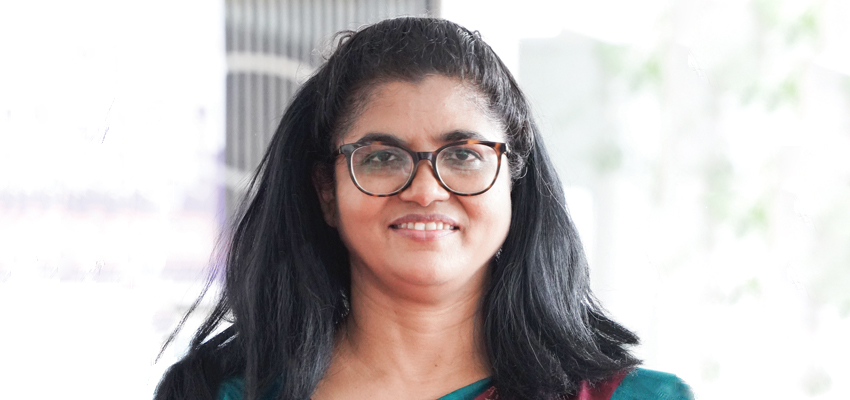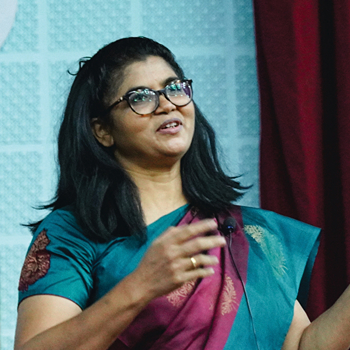Purpose Meets DIGITAL

In a world increasingly shaped by automation, AI and digital disruption, the quest for purposeful work has never been more urgent or complex. Malar Vili K sees her mission as enabling purposeful growth in a rapidly evolving ecosystems. Currently serving as the Senior Director at Sutherland, she is a seasoned digital strategist with over 26 years of experience in IT, leadership and transformation. She is an alumna of IIM Nagpur and a recipient of the ‘Innovation Leadership Award 2025’presented by the World Innovation Congress, honouring exceptional contributions in driving innovation, leadership, and sustainable impact. In an insightful conversation with Corporate Citizen, Malar shares how careers can be designed with purpose, where digital skills are no longer optional, why MBAs must blend structure with experimentation if they want to lead in the digital era, and more
"The most fulfilling careers are those that evolve, adapt, and continue to serve a larger purpose. In a world of disruption, the most powerful asset is a purposeful and digitally empowered you"
— Malar Vili K
Corporate Citizen: How do you define a ‘purposeful’ career in the ever-evolving digital ecosystem? What indicators help professionals know they are on the right track?
Malar Vili K: A purposeful career is one where your strengths, passions, values, and the impact you want to create come together. In a world shaped by rapid digital disruption, a purposeful career isn’t defined by a title or salary alone—it’s about clarity of why you do what you do and how it aligns with something bigger than yourself.
In the digital era, where job roles evolve quickly and industries are constantly reshaped, purpose becomes an anchor. It helps you navigate uncertainty with intention. Purposeful professionals don’t just chase growth, they create value, solve meaningful problems, and feel intrinsically motivated.
The indicators that you are on the right path include—energy over exhaustion, you feel more energised than depleted after a day’s work. Your work aligns with your personal ethics and beliefs. You see how your work makes a difference, whether in your team, your organisation or society. You are motivated to learn because you care, not just because you have to do the work. Purpose leads to greater engagement and longer-term success. In essence, purposeful careers are not stumbled upon; they are consciously designed and refined over time.
"Focus on value creation, value creators not just perform tasks, but also thrive in the AI-augmented workplace. Machines do tasks, but humans design, decide, and deliver impact"
CC: What are the top three emerging digital career paths that students today should consider taking up?

The future of work is already here—it looks very different from what existed even five years ago. As a digital strategist, I see exciting, highimpact career paths that blend technology with strategy, sustainability and ethics.
Sustainability and ESG Technology: As businesses aim for net-zero targets and responsible growth, roles in ESG are growing fast. ESG data analyst, sustainability consultant, or green tech product manager these roles combine analytics, policy, and digital tools to drive impact.
Responsible AI and Tech Ethics: We need professionals who can guide the ethical development and deployment of AI. Careers like AI policy analyst, AI ethics consultant, and human-centered product designer are increasingly relevant. These roles are multidisciplinary, blending tech knowledge with social science, philosophy and research.
Digital Strategy and Transformation Consulting: Businesses across sectors need professionals who can lead digital transformation journeys. Strategy consultants who understand cloud, AI, agile methodologies, and customer experience design, will be in high demand. These roles also involve change management and stakeholder alignment, critical skills for MBAs.
All three paths are growing, purpose-driven, and future-proof. They reward curiosity, agility, and strategic thinking traits many MBA students already possess.
CC: What kind of digital skillsets will be non-negotiable in the next five years, for both freshers and mid-career professionals?
The digital economy is flattening industry boundaries and redefining job roles. Today, being non-tech is no longer an excuse for digital illiteracy. Across industries, roles, and levels, a new digital baseline is forming.
Digital fluency includes comfort with tools like Microsoft Teams, Notion, Jira, Slack, Zoom, and even other generative AI platforms. Knowing how to manage digital workflows, collaborating remotely, and present virtually is essential. Data literacy professionals must be able to read and interpret data, ask the right questions, and use data to drive decisions. Tools like Excel, Power BI, Tableau or Google Data Studio, are becoming mainstream for that.
While not everyone needs to code, it’s critical to understand AI, automation, cloud computing, cybersecurity, and APIs. This techsavviness helps in strategy, decision-making, and cross-functional collaboration. Power skills of humans includes emotional intelligence, communication, empathy, critical thinking, and the ability to lead hybrid or virtual teams. Lifelong learning—the real meta-skill is the ability to learn, unlearn and relearn. Microcredentials, certifications and digital bootcamps will be a regular part of career progression.
The World Economic Forum calls this "The fusion of technical capability and emotional intelligence". Future leaders will not just lead people—they’ll lead platforms, processes and purpose simultaneously.
CC: With automation and AI transforming job roles, how should one prepare to stay relevant and irreplaceable in their careers?
Automation is accelerating, but rather than fearing it, we must learn to partner with it. AI will replace tasks, not jobs. What it cannot replace is human creativity, ethical judgment, emotional nuance, and complex problem-solving.
To stay relevant, one should embrace lifelong learning, pursue certifications and digital upskilling in areas like data analytics, no-code tools, sustainability, and agile methodologies. Learn not only tools but also frameworks.
Practice design thinking, this user-centric approach to problem-solving is invaluable across roles be it product, consulting, HR or marketing. It sharpens empathy, iteration and innovation. Build a personal brand, share your insights and learning journey on platforms like LinkedIn. This visibility builds trust and attracts opportunities.
Develop AI co-creation skills, and use AI to assist in content creation, summarisation or ideation. Knowing how to use AI responsibly will be a differentiator, especially in non-tech roles. Focus on value creation—value creators not just perform tasks, but also thrive in the AI-augmented workplace.
Remember that, machines do tasks— humans design, decide, and deliver impact.
CC: Many young professionals feel overwhelmed by the speed of digital disruption. How can they turn this challenge into an opportunity for growth?

Digital disruption can feel overwhelming, but it can also be empowering if approached with the right mindset. The pace of change means there’s always a chance to reinvent yourself, often faster than ever before.
Here’s how to make the shift from fear to fuel—be curious, not afraid. Treat disruption like a classroom. Ask, ‘What is this new tool or trend teaching me?’ Experiment in safe spaces, launch a blog, join a hackathon, take on a side project. Practice builds confidence. Find your community, join digital forums, alumni groups, or industry events. Learn from others navigating similar journeys.
Micro-skill, Macro-impact don’t try to master everything. Pick one or two key skills per quarter and go deep. Reflect often, set aside time to ask - What am I building? What am I excited to learn next? Self-reflection anchors learning.
Disruption is uncomfortable, but discomfort leads to growth. Those who stay engaged, keep learning and stay open to change, will not just survive—they will lead.
"In the digital era, where job roles evolve quickly and industries are constantly reshaped, purposeful career becomes an anchor. It helps you navigate uncertainty with intension"
CC: How did your experience at IIM Nagpur shape your digital mindset? What parts of your MBA do you apply daily in your current role?
When I was at IIM Nagpur I was deeply formative—not just academically, but also in how it shaped my thinking, collaboration and adaptability, in a digital-first world.
There is a list of values I carry with me every day, which includes:
Strategic thinking—courses in business strategy and digital transformation taught me to connect the dots between business objectives and tech solutions. Today, I apply that thinking when helping organisations align digital initiatives with enterprise goals.
Cross-functional leadership—working on diverse group projects with peers from various backgrounds gave me an appreciation for team dynamics and the importance of influencing without authority, which is a key to digital collaboration today.
Structured problem solving—frameworks like Porter’s Five Forces, McKinsey’s 7S and Business Model Canvas, trained me to break down complex problems. This is useful in digital consulting engagements.
Agility in learning—IIM Nagpur gave me the confidence to learn fast, adapt and navigate ambiguity. Whether leading change or piloting innovation, this agility is my strongest tool. Most importantly, it reinforced my belief in lifelong learning. Even today, I see myself as a student— exploring, experimenting and growing, in this fast-evolving digital world.
CC: There is a lot of debate today on whether a traditional MBA is still worth it in the digital era. What’s your perspective, especially for aspiring digital leaders?
This is a question I hear often, and it’s both valid and timely. The answer is not binary, it depends on how the MBA experience is approached. A traditional MBA is still highly relevant. In the digital era, an MBA becomes a powerful launchpad when paired with real-world exposure, and a digital-first mindset.
Here’s why it still matters—it builds foundational business acumen from strategy to finance, operations to marketing; you learn to see the bigger picture and how all functions interconnect in a business ecosystem. It sharpens leadership and decision-making skills. Group projects, simulations and live case studies push you to make informed, timebound choices often in ambiguous situations. It offers unparalleled peer learning and networks. One of the strongest assets of a B-school is the peer group—the conversations you have with diverse classmates often lead to new ideas, ventures and perspectives.
But, here’s the caveat, if MBA students don’t use their two years for exploring digital tools, joining industry events, or interning with future-focused firms, they might graduate with outdated capabilities.
To thrive as a digital leader, students must blend their MBA education with certifications in trending areas like data analytics, product management, blockchain or ESG reporting. Hands-on experience through startup internships or tech-driven projects and continuous upskilling beyond classroom learning.
In summary, a traditional MBA is worth it, but only if you align it with where the world is going, not just where it’s been.
CC: How important is it for MBA students to pick specialisations aligned with future digital trends like data strategy, digital marketing or tech consulting?

Specialisations act as starting points, not destinations. While they can give you an edge in a competitive job market, they shouldn’t restrict your learning. The real currency in the digital age is adaptability, and specialisation should be viewed as one lens, not the only one.
Having said that, selecting a specialisation aligned with digital trends can help in several ways - it enhances domain depth—you gain advanced skills and language fluency in a niche area, whether it’s analytics, digital supply chain, fintech, or AI ethics. It increases employability—recruiters look for early indicators of focus and commitment, and a relevant specialisation shows you're thinking long-term. It fosters alignment between your interests and future roles, if you’re passionate about tech, a digital specialisation makes your career narrative more coherent.
However, I always encourage students to stay cross-functional. For example, if you specialise in digital marketing, consider electives in behavioural economics or UX design. If you choose data strategy, complement it with courses in storytelling.
The best career paths today are hybrid. As industries converge, so should your learning. Your specialisation helps you build momentum, but it’s your mindset and range that will help you pivot, lead and thrive.
"Disruption is uncomfortable, but discomfort leads to growth. Those who stay engaged, keep learning, and stay open to change, will not just survive—they will lead"
CC: For students entering B-school today, how should they strategically use their two years to build a future-ready?
An MBA is no longer just an academic journey—it’s a two-year opportunity to prototype your future self. Here’s a strategic roadmap for MBA students to build a futureready, digital-first career:
Year 1: Explore and Discover
- Take diverse courses in areas like analytics, sustainability, digital strategy, or entrepreneurship. Discover what excites and energises you.
- Join student clubs related to tech, consulting, product management or startups
- Build your digital presence: start a blog, write on LinkedIn, or create a digital portfolio to showcase your thinking.
- Attend webinars and summits: get exposure to global trends early
Year 2: Deepen and Differentiate
- Choose electives that align with your goals, but also push your boundaries.
- Do live projects or internships in futurefacing roles like ESG consulting, product strategy or AI governance.
- Get certified in tools like Tableau, Power BI, Python or agile methodologies, or anything that aligns with your goal.
- Start building a mentor circle—reach out to alumni and professionals in roles you aspire to.
Also, treat your MBA as a safe space to fail and experiment. Test out startup ideas, volunteer for challenging roles in group projects, or explore new career paths.
By the end of two years, you should walk out with not just a degree, but a portfolio of experiences, capabilities and confidence, that reflects who you are and where you’re headed.
CC: Have internships, live projects or industry certifications, helped you more in the long run than conventional classroom learning?
Absolutely. Experiential learning has played a foundational role in my career growth. While classroom learning gave me the concepts and vocabulary of business, it was internships and real-world challenges that sharpened my instincts and leadership style.
Internships offered me a testing ground. They helped me understand the realities of different sectors, what kind of organisational cultures I thrive in, and what roles energise me. Live projects taught me how to manage ambiguity, work with diverse stakeholders, and deliver value under time constraints. Certifications helped me remain relevant. Whenever I sensed a gap, like data analytics, storytelling or ESG, I turned towards online learning to bridge it. For instance, when I transitioned from delivery to strategy, I pursued certifications in design thinking and digital innovation. These didn’t just boost my resume, they reshaped how I thought and operated.
That said, classroom learning gave me structure and frameworks, which became invaluable during high-pressure decisionmaking. It helped me understand the “why” behind actions, not just the “how”.
In conclusion, it’s not about choosing between the classroom or the real world, it’s about integrating both. One gives you the lens, the other, the clarity.
While leading with purpose in a digital age, the future doesn’t just belong to those with the most data, the flashiest tools or the longest resumes. It belongs to those who combine clarity of purpose with digital agility. As students and young professionals navigating this landscape, I encourage you to anchor your ambitions in impact. Ask not just, what can I do? But, what needs to be done? Stay relentlessly curious— technology will keep evolving, so should you. Use purpose as your compass—when overwhelmed by choices, return to what feels meaningful.
The most fulfilling careers are those that evolve, adapt, and continue to serve a larger purpose. And remember, in a world of disruption, the most powerful asset is a purposeful and digitally empowered you.